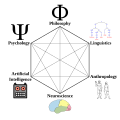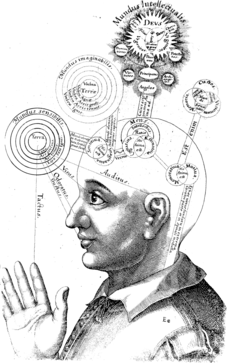Computational cognition (sometimes referred to as computational cognitive science or computational psychology or cognitive simulation) is the study of...
14 KB (1,570 words) - 12:12, 6 April 2024
Cognitive model (redirect from Models of cognition)
parallel rather than in competition. Computational cognition Computational models of language acquisition Computational-representational understanding of...
27 KB (3,598 words) - 04:32, 5 May 2025
In philosophy of mind, the computational theory of mind (CTM), also known as computationalism, is a family of views that hold that the human mind is an...
24 KB (2,916 words) - 13:06, 26 February 2025
neural computation in the computational theory of cognition. The computational theory of mind asserts that not only cognition, but also phenomenal consciousness...
108 KB (12,602 words) - 07:32, 5 May 2025
folding models, Computational Engineering Models (CEM), and neural network models. Computational engineering Computational cognition Reversible computing...
4 KB (342 words) - 01:09, 20 February 2025
"Computational Verb Cellular Networks: Part I--A New Paradigm of Human Social Pattern Formation". International Journal of Computational Cognition. 7...
2 KB (265 words) - 10:01, 18 October 2024
Computational thinking (CT) refers to the thought processes involved in formulating problems so their solutions can be represented as computational steps...
31 KB (3,217 words) - 15:34, 9 May 2025
Cognitive science (redirect from Computational modeling of cognitive processes)
its processes. It examines the nature, the tasks, and the functions of cognition (in a broad sense). Mental faculties of concern to cognitive scientists...
74 KB (8,629 words) - 20:55, 22 April 2025
Springer book series on Computational Social Science Computational cognition Computational politics Computational sociology Computational statistics Social...
14 KB (1,554 words) - 00:43, 21 April 2025
Cognition is the "mental action or process of acquiring knowledge and understanding through thought, experience, and the senses". It encompasses all aspects...
51 KB (5,988 words) - 01:27, 16 April 2025
known as Computational theory of mind, also referred to as computationalism, which advances the thesis that neural computation explains cognition. The first...
4 KB (549 words) - 14:03, 14 April 2024
Computational linguistics is an interdisciplinary field concerned with the computational modelling of natural language, as well as the study of appropriate...
13 KB (1,163 words) - 04:40, 30 April 2025
179–80 Computability theory Hypercomputation Computational problem Limits of computation Computationalism The study of non-computable statements is the...
11 KB (1,215 words) - 14:44, 12 April 2025
such as cognitivism, computationalism, and Cartesian dualism. It is closely related to the extended mind thesis, situated cognition, and enactivism. The...
178 KB (21,027 words) - 16:38, 10 May 2025
physiology and cognitive abilities of the nervous system. Computational neuroscience employs computational simulations to validate and solve mathematical models...
41 KB (4,521 words) - 05:29, 2 November 2024
computational cognition at the School of Informatics, University of Edinburgh and director at the Institute for Language, Cognition and Computation....
1 KB (105 words) - 18:37, 25 November 2023
Metacognition (redirect from Meta-cognition)
The term metacognition literally means 'above cognition', and is used to indicate cognition about cognition, or more informally, thinking about thinking...
79 KB (10,093 words) - 06:56, 27 April 2025
Animal cognition encompasses the mental capacities of non-human animals, including insect cognition. The study of animal conditioning and learning used...
122 KB (15,111 words) - 00:57, 18 April 2025
theory of cognition, or similarly ACT-R). Many of these architectures are based on principle that cognition is computational (see computationalism). In contrast...
18 KB (1,252 words) - 17:21, 16 April 2025
"Architectures of Computational Verb Controllers: Towards a New Paradigm of Intelligent Control". International Journal of Computational Cognition. 3 (2): 74–101...
85 KB (12,110 words) - 21:05, 30 April 2025
Cellular neural network (section Model of computation)
"Computational Verb Cellular Networks: Part II--One-Dimensional Computational Verb Local Rules". International Journal of Computational Cognition. 7...
72 KB (10,029 words) - 11:52, 25 May 2024
(1995). Understanding understanding: syntactic semantics and computational cognition. Philosophical Perspectives, Vol. 9, AI, Connectionism and Philosophical...
49 KB (6,599 words) - 23:36, 6 April 2025
Turing completeness (redirect from Computational universality)
describe the computational power of a computational system (such as an abstract machine or programming language): Turing completeness A computational system...
32 KB (3,448 words) - 22:13, 10 March 2025
distributed cognition (distinct from other meanings) which takes a computational perspective towards goal-based activity systems. The distributed cognition approach...
31 KB (3,719 words) - 19:31, 28 March 2025
Design computing (redirect from Computational design)
Computing and Cognition DCC'18 or DCC18". dccconferences.org. Retrieved 2017-11-13. architecture.mit.edu/computation/program/overview "Computational Design |...
8 KB (907 words) - 18:16, 27 October 2024
Computational representational understanding of mind (CRUM) is a hypothesis in cognitive science which proposes that thinking is performed by computations...
2 KB (199 words) - 19:25, 13 August 2022
notes and patient histories. AI accelerator Cognitive computing Computational cognition Neuromorphic engineering Tensor Processing Unit Turing test Spiking...
23 KB (2,423 words) - 02:55, 19 April 2025
also known as computational cognitive science, is an approach to cognitive science concerned with the rational analysis of cognition through the use...
2 KB (231 words) - 23:12, 22 October 2023
In cognitive psychology, spatial cognition is the acquisition, organization, utilization, and revision of knowledge about spatial environments. It is...
66 KB (8,300 words) - 22:55, 18 April 2025
Numerical cognition is a subdiscipline of cognitive science that studies the cognitive, developmental and neural bases of numbers and mathematics. As...
33 KB (4,216 words) - 06:33, 27 December 2023






